Through community-based approach, Budikadidi is promoting critical nutrition, health and hygiene practices
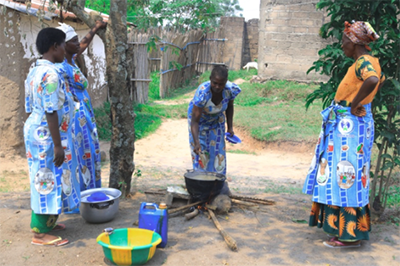 NCBA CLUSA’s “care group” approach in the Democratic Republic of Congo is empowering women like Bernadette Kapinga to transform their communities. Bernadette is a community-based health volunteer—known locally as a “lead mother.” After she received training from the Budikadidi project, Bernadette was elected by 14 neighboring households to lead local capacity-building and provide demonstrations on nutrition, health and hygiene.
NCBA CLUSA’s “care group” approach in the Democratic Republic of Congo is empowering women like Bernadette Kapinga to transform their communities. Bernadette is a community-based health volunteer—known locally as a “lead mother.” After she received training from the Budikadidi project, Bernadette was elected by 14 neighboring households to lead local capacity-building and provide demonstrations on nutrition, health and hygiene.
In her village of Katshienza, Bernadette is president of the local lead mothers organization, which focuses on self-reliance. Since 2018, lead mother groups have participated in several project-led training courses in health and nutrition—knowledge they have in turn passed on to mothers across 474 villages. Designed to spur behavior change in health and nutrition and promote essential hygiene practices, this approach has multiplier effects and has reached more than 70,000 households.
The backbone of Haiti’s rural economy: Women and smallholder farmers
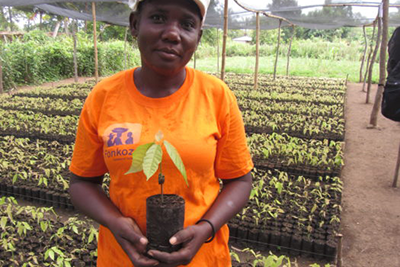 Did you know that in Haiti, women play a leading role in creating and commercializing value-added cacao products? But COVID-19 threatens to diminish post-harvest and value-added opportunities for them. In conversation with Jocelyne Augustin—a woman farmer, cacao horticulturist and cooperator in northern Haiti—we learned that there are few COVID-19 socioeconomic safety nets for women farmers in her community. And rural women are disproportionately more vulnerable to the setback of COVID-19. Jocelyne’s household income is 100 percent dependent on cacao farming.
Did you know that in Haiti, women play a leading role in creating and commercializing value-added cacao products? But COVID-19 threatens to diminish post-harvest and value-added opportunities for them. In conversation with Jocelyne Augustin—a woman farmer, cacao horticulturist and cooperator in northern Haiti—we learned that there are few COVID-19 socioeconomic safety nets for women farmers in her community. And rural women are disproportionately more vulnerable to the setback of COVID-19. Jocelyne’s household income is 100 percent dependent on cacao farming.
Her farmer’s co-op makes up an eighth of FECCANO, a federation of cocoa cooperatives in northern Haiti. Through FECCANO, farmers commercialize certified organic and ethical cacao, and implement agroforestry projects. Thanks to their ownership in FECCANO, smallholder farmers like Jocelyne can access equitable markets directly, bypassing speculators and middlemen.
The Unbreakable Alimata Korogo
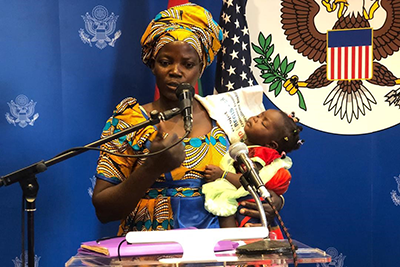 A few years ago, Alimata Korogo, a hard-working mother of six, was struggling to make ends meet as a peanut farmer in Burkina Faso. She was chronically food insecure, illiterate, in poor health and unable to escape debt. Then, she participated in a series of workshops on farming, home gardening, health, nutrition and literacy. She quickly became a leader, overseeing a group of 14 women with whom she shared the skills and knowledge received from NCBA CLUSA’s USAID-funded REGIS-ER project.
A few years ago, Alimata Korogo, a hard-working mother of six, was struggling to make ends meet as a peanut farmer in Burkina Faso. She was chronically food insecure, illiterate, in poor health and unable to escape debt. Then, she participated in a series of workshops on farming, home gardening, health, nutrition and literacy. She quickly became a leader, overseeing a group of 14 women with whom she shared the skills and knowledge received from NCBA CLUSA’s USAID-funded REGIS-ER project.
Since 2013, USAID’s Resilience in the Sahel Enhanced (RISE) program, supported by Feed the Future and implemented by partners like NCBA CLUSA, has helped reach more than 2.4 million people like Alimata to better manage crises, pursue a diverse range of job opportunities, feed their families and invest in their futures. Their increased resilience is contributing to breaking the cycle of crises and poverty while paving the way for peace and development in the Sahel.
Women farmers cultivate new climate-smart opportunities in Madagascar
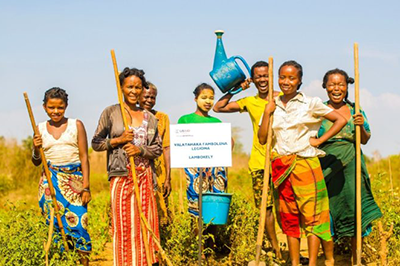 In a new article for Medium, A.G. Klei and Mialy Randriamampianina explore multiple climate change related issues facing farmers in Madagascar. The USAID Mikajy project, implemented by NCBA CLUSA, is supporting women farmers in learning how to become stewards of their land—nurturing it, watering it, feeding it and caring for it—so that it will continue to feed them and their families for generations. The women have learned new, conservation-friendly farming methods that promote minimal land use and cultivation of healthy soils. They have also been equipped with tools, including watering cans and shovels.
In a new article for Medium, A.G. Klei and Mialy Randriamampianina explore multiple climate change related issues facing farmers in Madagascar. The USAID Mikajy project, implemented by NCBA CLUSA, is supporting women farmers in learning how to become stewards of their land—nurturing it, watering it, feeding it and caring for it—so that it will continue to feed them and their families for generations. The women have learned new, conservation-friendly farming methods that promote minimal land use and cultivation of healthy soils. They have also been equipped with tools, including watering cans and shovels.
“We’re excited about the progress farmers—particularly women farmers—are making in the harsh Menabe landscape,” said Ryan Roberge, Senior Manager for Enterprise Development at NCBA CLUSA. “These income generating activities and other activities like village savings and loan associations are helping to build community resilience and conserve natural resources.”
Reimagining resilient food systems for food security post-COVID and beyond
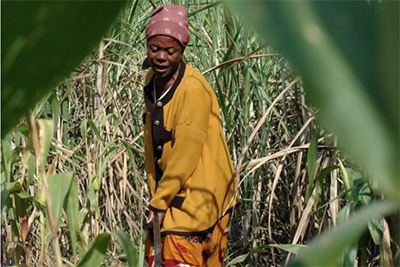 Rosa, a farmer from Mozambique, has a lot to say about producing and consuming healthy food in her local food system. Three years ago, she was issued a formal land title and started using climate-smart agricultural practices. Since then, she has doubled her yields of maize, beans, soy and pigeon peas.
Rosa, a farmer from Mozambique, has a lot to say about producing and consuming healthy food in her local food system. Three years ago, she was issued a formal land title and started using climate-smart agricultural practices. Since then, she has doubled her yields of maize, beans, soy and pigeon peas.
Commenting on how her life has changed, Rosa said, “I have improved my farming techniques; now my work is much easier and efficient.” The increase in yields has allowed Rosa to send her kids to school and save money, which she used to rebuild her home after it was leveled by Cyclone Idai in 2019. Even amid COVID, Rosa is remains resilient and optimistic.
What is the secret to her success? An integrated system that engages three levers for achieving a reimagined nutritious food system: land rights, climate-smart agriculture, and women’s empowerment.
In Mozambique, literacy skills open new possibilities for women
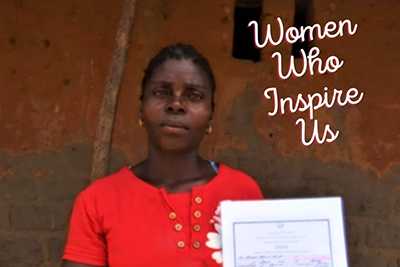 NCBA CLUSA’s PROMAC II project in Mozambique, funded by the Royal Norwegian Embassy in Maputo, has more than 5,600 farmers enrolled—65 percent of whom are women. This activity supports food security and livelihoods by promoting climate-smart agriculture. It also promotes functional literacy and numeracy, and invests in building up the skills of all its program participants, transforming smallholder farmers into entrepreneurs. Through NCBA CLUSA programming during the past 25 years, more than 75,000 adults have achieved literacy, over half of them women.
NCBA CLUSA’s PROMAC II project in Mozambique, funded by the Royal Norwegian Embassy in Maputo, has more than 5,600 farmers enrolled—65 percent of whom are women. This activity supports food security and livelihoods by promoting climate-smart agriculture. It also promotes functional literacy and numeracy, and invests in building up the skills of all its program participants, transforming smallholder farmers into entrepreneurs. Through NCBA CLUSA programming during the past 25 years, more than 75,000 adults have achieved literacy, over half of them women.
Women like Ana Manuel Cantema, who have achieved literacy and numeracy through PROMAC II, are now prepared to enter formal education, and are even passing the skills they’ve learned on to their neighbors—critical information, especially for rural women. And those skills have cascading effects, improving community health, bringing value to children’s education and building more resilient communities.
From Rwanda to Guatemala, cooperatives are building resilient, sustainable communities
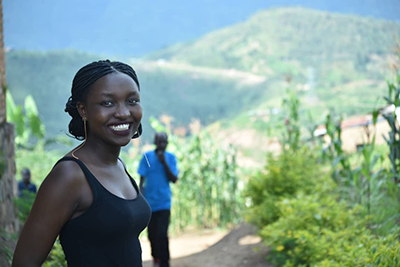 NCBA CLUSA was pleased to host Sandrine Bakuramutsa last summer as a Zero Hunger Intern through a partnership with the Congressional Hunger Center, a 501(c)(3) nonprofit that works to make issues of domestic and international hunger a priority to policymakers in the U.S. government, and to raise a new generation of leaders to fight against hunger and poverty. Born and raised in Gakenke, Rwanda, Sandrine is a senior at Michigan State University where she studies Food Science and Food Industry Management. On campus, Sandrine is a member of the Spartan Global Development Fund, a student-run nonprofit organization that creates awareness about the role of microfinances and fair trade as grassroots tools to achieve sustainable solutions to global hunger and poverty. Earlier this year, she participated in a spring break anti-hunger education abroad program in Guatemala.
NCBA CLUSA was pleased to host Sandrine Bakuramutsa last summer as a Zero Hunger Intern through a partnership with the Congressional Hunger Center, a 501(c)(3) nonprofit that works to make issues of domestic and international hunger a priority to policymakers in the U.S. government, and to raise a new generation of leaders to fight against hunger and poverty. Born and raised in Gakenke, Rwanda, Sandrine is a senior at Michigan State University where she studies Food Science and Food Industry Management. On campus, Sandrine is a member of the Spartan Global Development Fund, a student-run nonprofit organization that creates awareness about the role of microfinances and fair trade as grassroots tools to achieve sustainable solutions to global hunger and poverty. Earlier this year, she participated in a spring break anti-hunger education abroad program in Guatemala.
Facilitating local entrepreneurship: One woman’s story
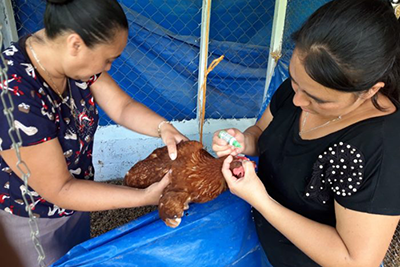 The families of coffee farmers in Guatemala depend directly on the profits generated by the sale of coffee beans. But as global coffee prices has fallen, families have seen their incomes drop, and women’s involvement in the coffee value chain has been marginalized. But NCBA CLUSA’s Coffee Value Chains project is helping women like Merly Efigenia Rodriguez Lopez become entrepreneurs. Merly was chosen to serve as an agricultural community worker and has learned how to vaccinate, feed and care for laying hens and fattening chickens.
The families of coffee farmers in Guatemala depend directly on the profits generated by the sale of coffee beans. But as global coffee prices has fallen, families have seen their incomes drop, and women’s involvement in the coffee value chain has been marginalized. But NCBA CLUSA’s Coffee Value Chains project is helping women like Merly Efigenia Rodriguez Lopez become entrepreneurs. Merly was chosen to serve as an agricultural community worker and has learned how to vaccinate, feed and care for laying hens and fattening chickens.
In 2019, she received 30 laying hens as seed capital. Three months later, she invested USD $800 of her own savings and credit to purchase 100 additional hens. “I cannot express my happiness in this moment,” Merly said. “Now that I have my business, it has opened doors and allowed me to help my people. I have now made a profit with my egg sales.” She attributes her success to her involvement in the Coffee Value Chains project. “I did not expect that I would have my own farm with this project,” she added.
Increasing sexual and reproductive health services is transforming the lives of Ugandan youth
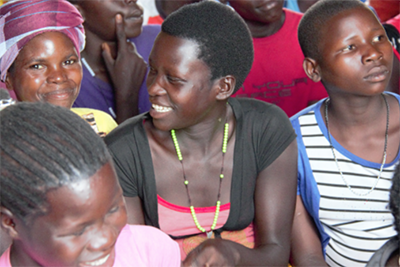 NCBA CLUSA’s Mastercard Foundation-funded Youth Empowerment Through Agriculture (YETA) project in Uganda supported activities at the health systems, community and individual levels. Health systems support included creating adolescent-friendly corners at clinics and health centers and providing training to health service providers on adolescent-friendly services. Community level support included social networking, mobilizing peer leaders, distributing condoms, and facilitating referral and communication processes.
NCBA CLUSA’s Mastercard Foundation-funded Youth Empowerment Through Agriculture (YETA) project in Uganda supported activities at the health systems, community and individual levels. Health systems support included creating adolescent-friendly corners at clinics and health centers and providing training to health service providers on adolescent-friendly services. Community level support included social networking, mobilizing peer leaders, distributing condoms, and facilitating referral and communication processes.
At the individual level, youth were trained in safe sex practices, proper condom use and building healthy relationships. The project also encouraged youth—particularly girls—to openly discuss and ask questions about their health and access healthcare services, helping to lift the stigma around sexual reproductive health. As a result, young women say they have gained more respect in their communities, and report a decrease in gender-based violence.
For one Honduran women’s organization, strategic development is the path to sustainability and entrepreneurial growth
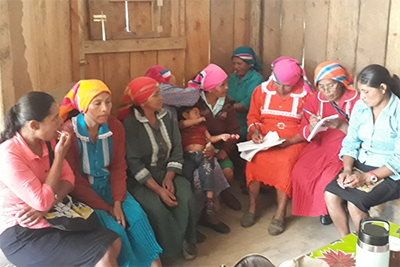 NCBA CLUSA’s USAID-funded Farmer-to-Farmer program volunteers work with farmers, producer groups, rural businesses and service providers to develop the local capacity necessary to enhance food security, increase incomes, spur economic growth and address environmental and natural resource management challenges. NCBA CLUSA’s Farmer-to-Farmer work falls under our Strengthening Cooperatives practice area, which is dedicated to developing strong, inclusive cooperatives and producer groups that support equal participation, leadership and agency among all women, men and youth. Projects in this area support women’s entry and leadership in their local economies through cooperative development—promoting, strengthening and helping grow cooperative businesses.
NCBA CLUSA’s USAID-funded Farmer-to-Farmer program volunteers work with farmers, producer groups, rural businesses and service providers to develop the local capacity necessary to enhance food security, increase incomes, spur economic growth and address environmental and natural resource management challenges. NCBA CLUSA’s Farmer-to-Farmer work falls under our Strengthening Cooperatives practice area, which is dedicated to developing strong, inclusive cooperatives and producer groups that support equal participation, leadership and agency among all women, men and youth. Projects in this area support women’s entry and leadership in their local economies through cooperative development—promoting, strengthening and helping grow cooperative businesses.
Keep reading to learn about how strategic development is the path to sustainability and entrepreneurial growth for one women’s organization in Honduras.
Workshop series addresses traditional masculinity and gender norms in the coffee value chain
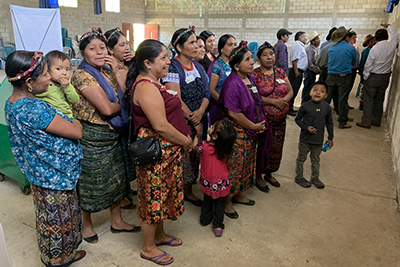 NCBA CLUSA’s objectives under its USAID-funded Coffee Value Chains Project include working with women and youth to improve nutrition and income generation through the creation of savings and loans groups, as well as supporting household poultry production and home gardens for nutrient-dense crops. NCBA CLUSA also leads gender and social inclusion activities for the project, including providing training and technical assistance to consortium partners and community members on equitable social and gender norms. The project falls under our Creating Economic Opportunities practice area, which addresses gaps and barriers for women in specific value chains, including gendered division of labor, equity in pay, access to financial services, access to technology or inputs and market linkages.
NCBA CLUSA’s objectives under its USAID-funded Coffee Value Chains Project include working with women and youth to improve nutrition and income generation through the creation of savings and loans groups, as well as supporting household poultry production and home gardens for nutrient-dense crops. NCBA CLUSA also leads gender and social inclusion activities for the project, including providing training and technical assistance to consortium partners and community members on equitable social and gender norms. The project falls under our Creating Economic Opportunities practice area, which addresses gaps and barriers for women in specific value chains, including gendered division of labor, equity in pay, access to financial services, access to technology or inputs and market linkages.
Read on to hear about a workshop series hosted by the project to address traditional masculinity and gender norms within the coffee value chain.
A mother’s journey to self-reliance
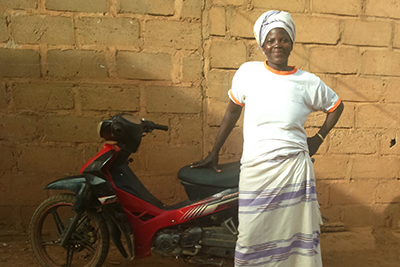 USAID defines resilience as the ability of people, households, communities, countries and systems to mitigate, adapt to and recover from shocks and stresses in a manner that reduces chronic vulnerability and facilitates inclusive growth. NCBA CLUSA’s USAID-funded Resilience and Economic Growth in the Sahel-Enhanced Resilience (REGIS-ER) project falls under our Building Resilient Communities practice area. Projects in this portfolio focus on gender integration and women’s empowerment in the areas of governance, health and nutrition, agriculture, climate change adaptation, natural resource management and disaster risk reduction.
USAID defines resilience as the ability of people, households, communities, countries and systems to mitigate, adapt to and recover from shocks and stresses in a manner that reduces chronic vulnerability and facilitates inclusive growth. NCBA CLUSA’s USAID-funded Resilience and Economic Growth in the Sahel-Enhanced Resilience (REGIS-ER) project falls under our Building Resilient Communities practice area. Projects in this portfolio focus on gender integration and women’s empowerment in the areas of governance, health and nutrition, agriculture, climate change adaptation, natural resource management and disaster risk reduction.
These projects also support women’s land tenure, literacy and numeracy initiatives, husband’s schools for improved family nutrition, equity in household decision-making, and strengthening women’s groups and networks. Read on to learn about one mother’s journey to self-reliance with the help of REGIS-ER.
In Senegal, addressing the needs of the entire household
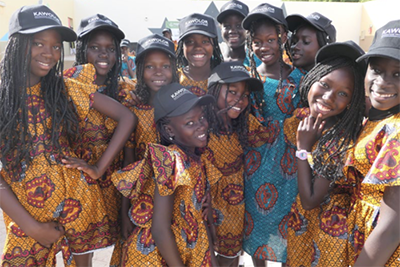 NCBA CLUSA’s USAID-funded Feed the Future Kawolor project in Senegal works to improve nutrition for children and mothers through a systems approach to the availability, education and sustainability of nutritious foods. Kawolor utilizes debbo galle, or mothers’ groups, as a platform to introduce mothers, women of reproductive age and fathers to nutrition education, horticulture activities, savings for investment, income-generating activities and household decision-making.
NCBA CLUSA’s USAID-funded Feed the Future Kawolor project in Senegal works to improve nutrition for children and mothers through a systems approach to the availability, education and sustainability of nutritious foods. Kawolor utilizes debbo galle, or mothers’ groups, as a platform to introduce mothers, women of reproductive age and fathers to nutrition education, horticulture activities, savings for investment, income-generating activities and household decision-making.
By addressing the needs of the entire household, Kawolor is building sustainable skills and resources, ensuring that these approaches lead to the adoption of better feeding and food preparation and, ultimately, better nutritional outcomes for children. The project contributes to the Senegalese Government’s strategy to curb malnutrition, food insecurity and poverty. It also works to mainstream women’s economic and social empowerment by using positive male role models who demonstrate supporting their wives’ leadership and decision-making.


